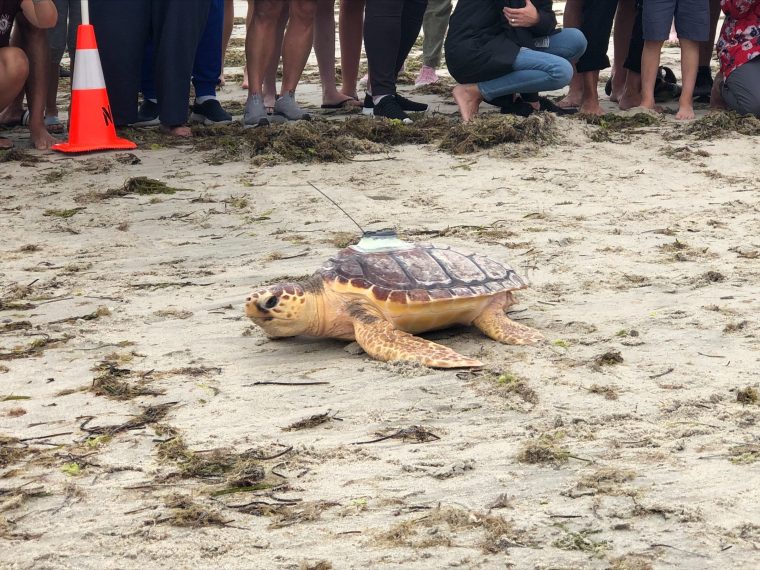Aquarium pioneers use of acoustic tags that will allow researchers to track turtle movement

BOSTON, MASS. (Aug. 5, 2021) – After seven months of rehabilitation at the New England Aquarium, four loggerhead sea turtles rescued from the shores of Cape Cod are back in the wild.
**PHOTOS AND VIDEO COURTESY OF NEW ENGLAND AQUARIUM AVAILABLE HERE**
The turtles became cold-stunned in December and arrived at the Aquarium’s Sea Turtle Hospital in Quincy, MA, after being rescued by staff and volunteers with Mass Audubon’s Wellfleet Bay Wildlife Sanctuary. Aquarium staff treated the turtles for a variety of life-threatening medical conditions, including hypothermia, pneumonia, and bone fractures. After physical examinations last month, staff veterinarians cleared the loggerheads to return to the wild. They were released back into the waters off Cape Cod on Thursday.
“Caring for rescued turtles, especially bigger species such as loggerheads, takes a tremendous amount of manpower and resources. When you have the opportunity to release them back to their ocean home, to cheer them on alongside colleagues who have been a part of their journey, is incredibly rewarding,” said Adam Kennedy, Supervisor of Rescue and Rehabilitation at the Aquarium.
As part of its work safeguarding ocean animals and habitats, the Aquarium will be tracking and studying the movement of these turtles. Prior to being released, the four loggerheads were outfitted with internal acoustic tags and two also received satellite tags. These tags will provide valuable data about where the turtles swim, feed, and travel, information that Aquarium researchers can use to help protect this threatened species.
“Sea turtle conservation depends on sound science. We use electronic tags to understand how well these turtles adapt to life in the wild, that they not only survive but thrive. I’m especially excited about this release, since the acoustic tags will give us at least three years of information, much longer than any of our previous tagging efforts,” said Dr. Kara Dodge, research scientist in the Aquarium’s Anderson Cabot Center for Ocean Life.
The New England Aquarium is pioneering the use of implanted acoustic tags in sea turtles for long-term monitoring. These tags are routinely used in fish and sharks and can provide up to a decade of information about animal movements and survival. The Anderson Cabot Center for Ocean Life is working with several close research collaborators to expand acoustic telemetry monitoring capabilities in New England, offering an exciting opportunity to collect habitat-use data on multiple marine species, including sea turtles, over the next 5 to 10 years.
For more than 30 years, the New England Aquarium has helped rescue, rehabilitate, release, and research endangered and threatened sea turtles. This past turtle stranding season, which began in October, required strict safety protocols and tight coordination with partner organizations amid the pandemic. The Aquarium worked closely with Mass Audubon’s Wellfleet Bay Wildlife Sanctuary, National Marine Life Center, the National Oceanic and Atmospheric Administration’s (NOAA) Fisheries Service, and Turtles Fly Too to save hundreds of turtles. Over the course of the season, the Aquarium admitted 569 sea turtles for rehabilitation. There are three turtles remaining at the Quincy facility, which will be released this summer once medically cleared by Aquarium veterinarians.
MEDIA CONTACT:
Pam Bechtold Snyder – psnyder@neaq.org, 617-686-5068
